Business Law Assignment: UK Business Law and its Impact (HND)
VerifiedAdded on 2022/11/17
|20
|4449
|439
Report
AI Summary
This report provides a detailed examination of UK business law, addressing key aspects such as parliamentary sovereignty, the sources of law in the UK, and the structure of the court system. It explores the role of government in the law-making process, differentiating between common and statutory laws and their application in justice courts. The report further analyzes the potential impact of employment, company, and contract law on businesses, highlighting the significance of these legal areas for business operations and decision-making. The assignment covers topics like employment contracts, company liabilities, environmental and health and safety legislation, and contract formation, providing a comprehensive overview of the legal landscape relevant to businesses operating in the UK.
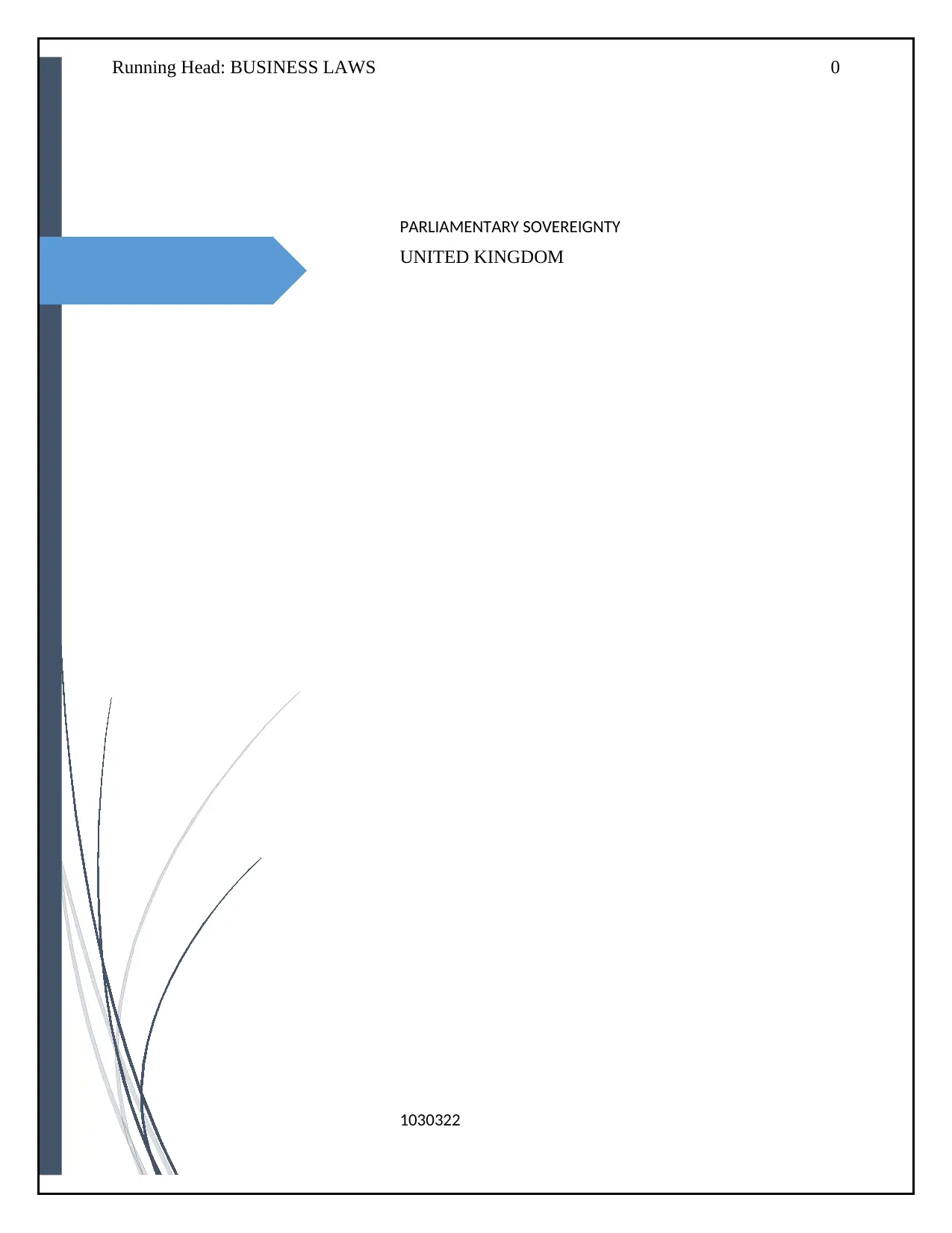
Running Head: BUSINESS LAWS 0
PARLIAMENTARY SOVEREIGNTY
UNITED KINGDOM
1030322
PARLIAMENTARY SOVEREIGNTY
UNITED KINGDOM
1030322
Paraphrase This Document
Need a fresh take? Get an instant paraphrase of this document with our AI Paraphraser
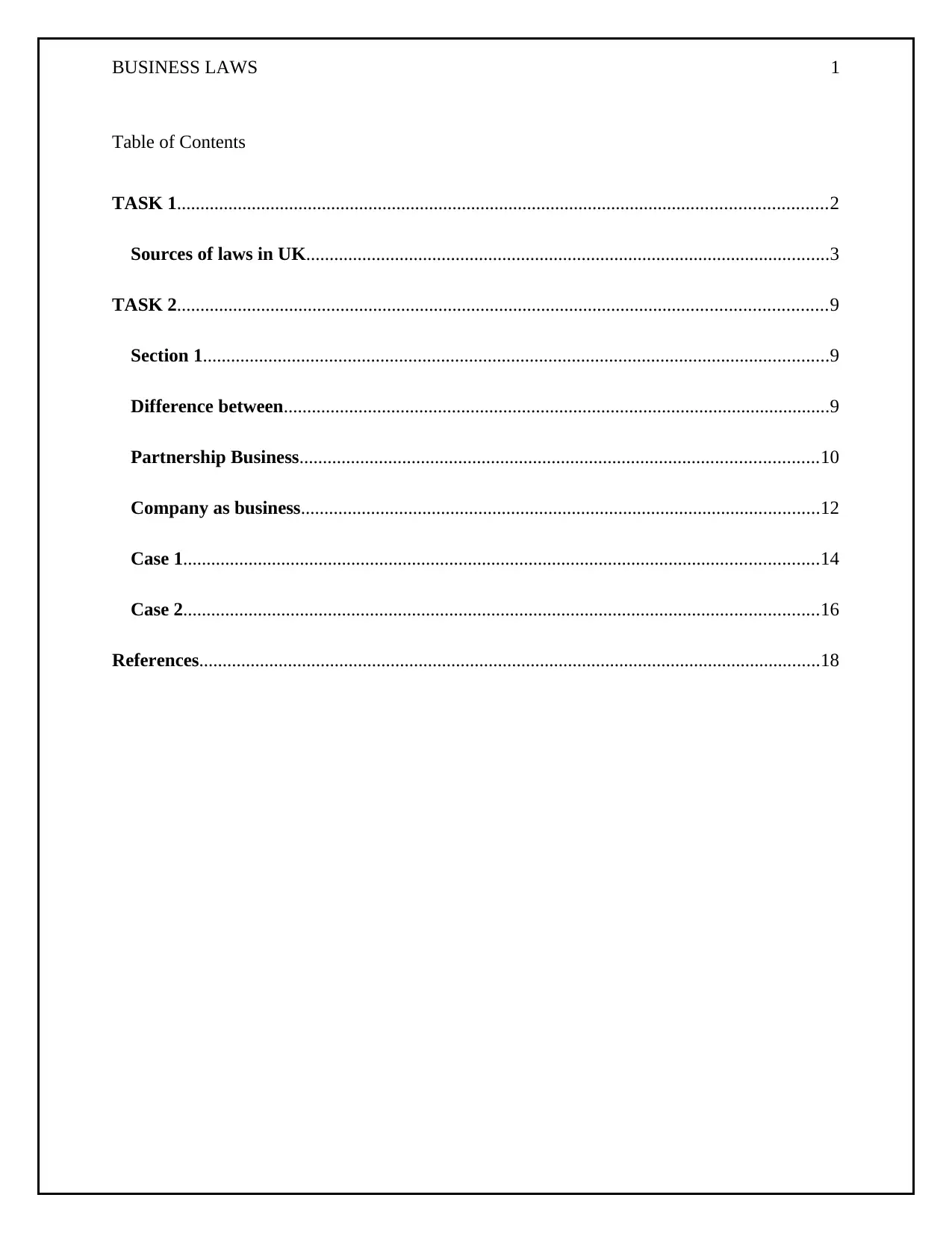
BUSINESS LAWS 1
Table of Contents
TASK 1...........................................................................................................................................2
Sources of laws in UK................................................................................................................3
TASK 2...........................................................................................................................................9
Section 1......................................................................................................................................9
Difference between.....................................................................................................................9
Partnership Business...............................................................................................................10
Company as business...............................................................................................................12
Case 1........................................................................................................................................14
Case 2........................................................................................................................................16
References.....................................................................................................................................18
Table of Contents
TASK 1...........................................................................................................................................2
Sources of laws in UK................................................................................................................3
TASK 2...........................................................................................................................................9
Section 1......................................................................................................................................9
Difference between.....................................................................................................................9
Partnership Business...............................................................................................................10
Company as business...............................................................................................................12
Case 1........................................................................................................................................14
Case 2........................................................................................................................................16
References.....................................................................................................................................18
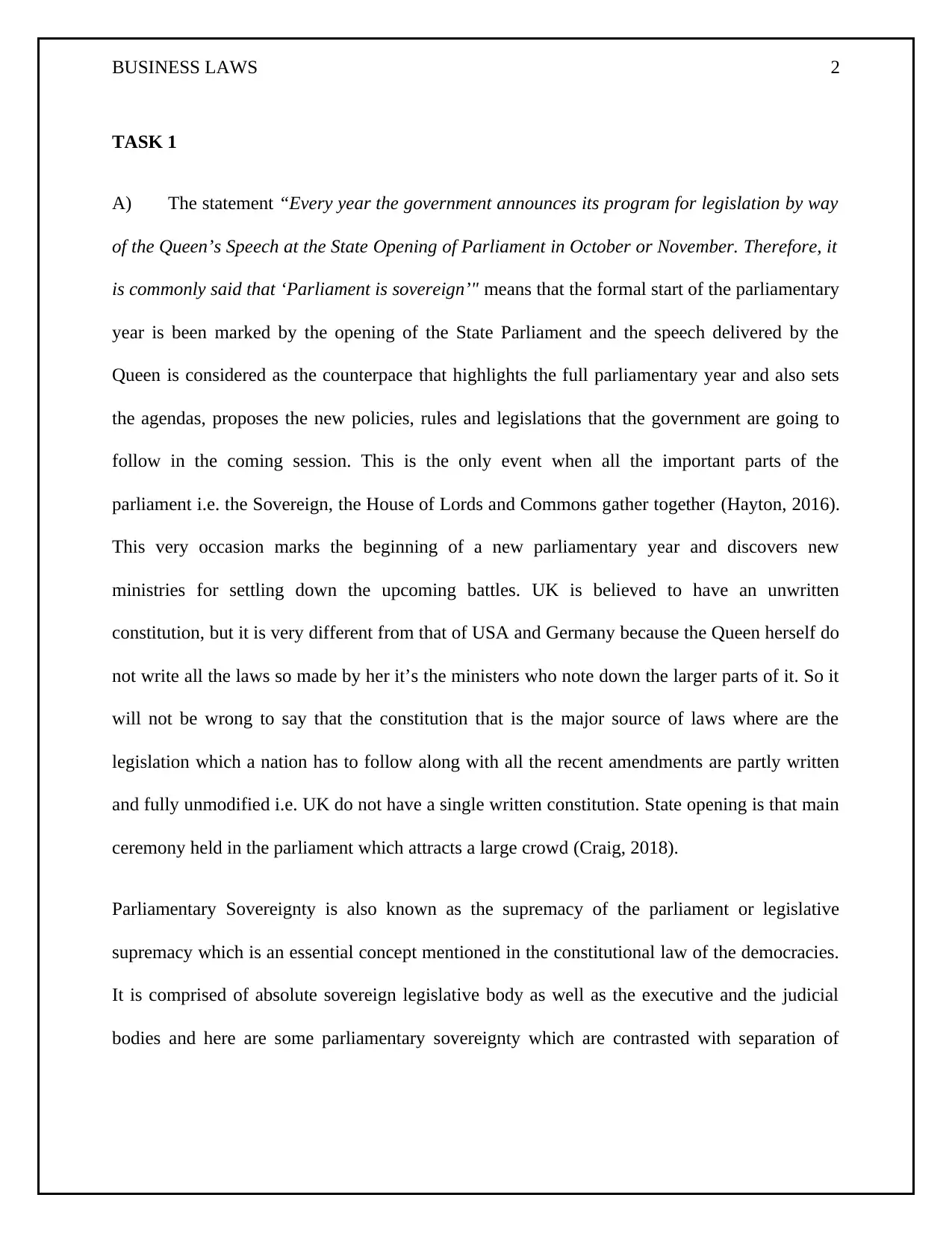
BUSINESS LAWS 2
TASK 1
A) The statement “Every year the government announces its program for legislation by way
of the Queen’s Speech at the State Opening of Parliament in October or November. Therefore, it
is commonly said that ‘Parliament is sovereign’" means that the formal start of the parliamentary
year is been marked by the opening of the State Parliament and the speech delivered by the
Queen is considered as the counterpace that highlights the full parliamentary year and also sets
the agendas, proposes the new policies, rules and legislations that the government are going to
follow in the coming session. This is the only event when all the important parts of the
parliament i.e. the Sovereign, the House of Lords and Commons gather together (Hayton, 2016).
This very occasion marks the beginning of a new parliamentary year and discovers new
ministries for settling down the upcoming battles. UK is believed to have an unwritten
constitution, but it is very different from that of USA and Germany because the Queen herself do
not write all the laws so made by her it’s the ministers who note down the larger parts of it. So it
will not be wrong to say that the constitution that is the major source of laws where are the
legislation which a nation has to follow along with all the recent amendments are partly written
and fully unmodified i.e. UK do not have a single written constitution. State opening is that main
ceremony held in the parliament which attracts a large crowd (Craig, 2018).
Parliamentary Sovereignty is also known as the supremacy of the parliament or legislative
supremacy which is an essential concept mentioned in the constitutional law of the democracies.
It is comprised of absolute sovereign legislative body as well as the executive and the judicial
bodies and here are some parliamentary sovereignty which are contrasted with separation of
TASK 1
A) The statement “Every year the government announces its program for legislation by way
of the Queen’s Speech at the State Opening of Parliament in October or November. Therefore, it
is commonly said that ‘Parliament is sovereign’" means that the formal start of the parliamentary
year is been marked by the opening of the State Parliament and the speech delivered by the
Queen is considered as the counterpace that highlights the full parliamentary year and also sets
the agendas, proposes the new policies, rules and legislations that the government are going to
follow in the coming session. This is the only event when all the important parts of the
parliament i.e. the Sovereign, the House of Lords and Commons gather together (Hayton, 2016).
This very occasion marks the beginning of a new parliamentary year and discovers new
ministries for settling down the upcoming battles. UK is believed to have an unwritten
constitution, but it is very different from that of USA and Germany because the Queen herself do
not write all the laws so made by her it’s the ministers who note down the larger parts of it. So it
will not be wrong to say that the constitution that is the major source of laws where are the
legislation which a nation has to follow along with all the recent amendments are partly written
and fully unmodified i.e. UK do not have a single written constitution. State opening is that main
ceremony held in the parliament which attracts a large crowd (Craig, 2018).
Parliamentary Sovereignty is also known as the supremacy of the parliament or legislative
supremacy which is an essential concept mentioned in the constitutional law of the democracies.
It is comprised of absolute sovereign legislative body as well as the executive and the judicial
bodies and here are some parliamentary sovereignty which are contrasted with separation of
⊘ This is a preview!⊘
Do you want full access?
Subscribe today to unlock all pages.

Trusted by 1+ million students worldwide
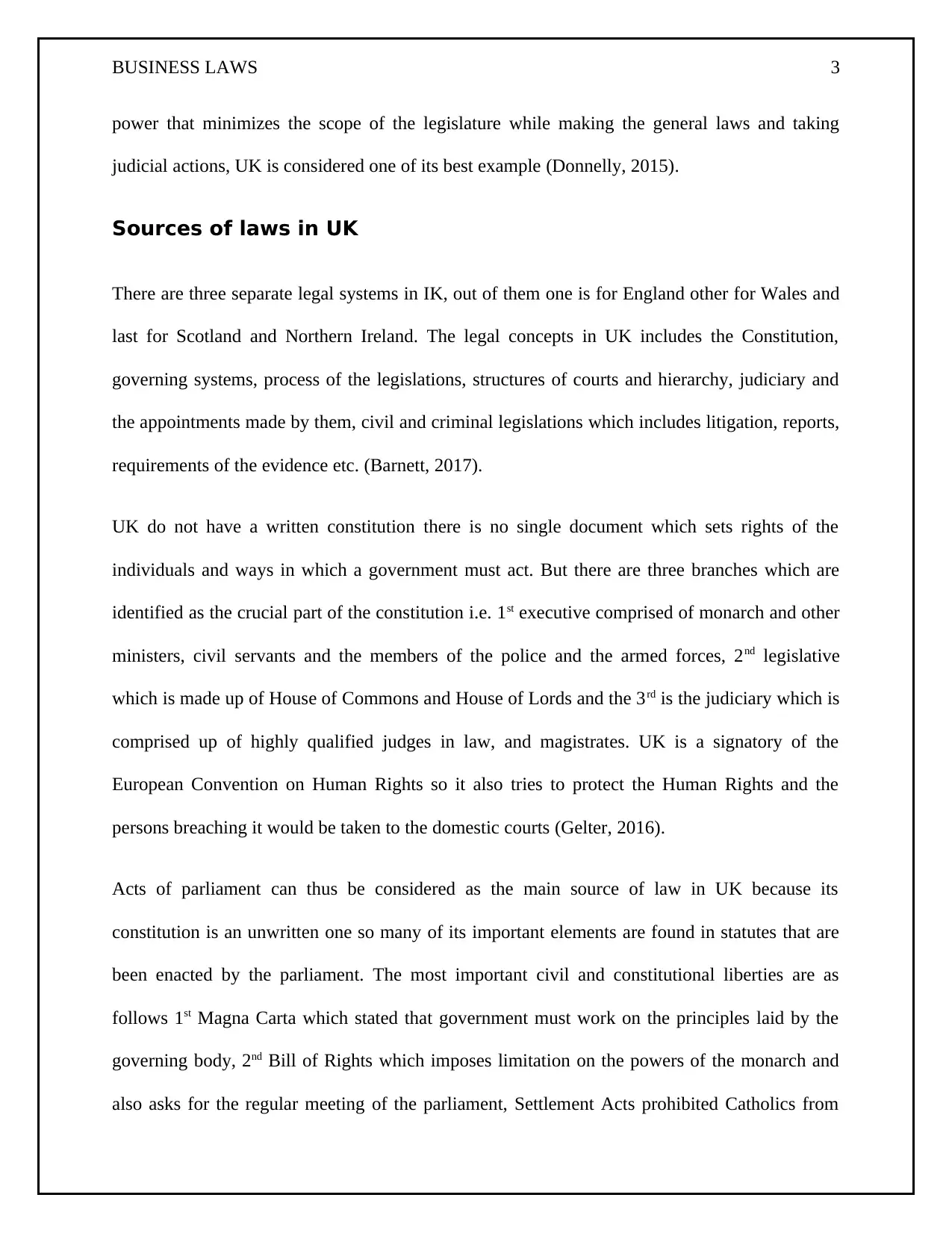
BUSINESS LAWS 3
power that minimizes the scope of the legislature while making the general laws and taking
judicial actions, UK is considered one of its best example (Donnelly, 2015).
Sources of laws in UK
There are three separate legal systems in IK, out of them one is for England other for Wales and
last for Scotland and Northern Ireland. The legal concepts in UK includes the Constitution,
governing systems, process of the legislations, structures of courts and hierarchy, judiciary and
the appointments made by them, civil and criminal legislations which includes litigation, reports,
requirements of the evidence etc. (Barnett, 2017).
UK do not have a written constitution there is no single document which sets rights of the
individuals and ways in which a government must act. But there are three branches which are
identified as the crucial part of the constitution i.e. 1st executive comprised of monarch and other
ministers, civil servants and the members of the police and the armed forces, 2nd legislative
which is made up of House of Commons and House of Lords and the 3rd is the judiciary which is
comprised up of highly qualified judges in law, and magistrates. UK is a signatory of the
European Convention on Human Rights so it also tries to protect the Human Rights and the
persons breaching it would be taken to the domestic courts (Gelter, 2016).
Acts of parliament can thus be considered as the main source of law in UK because its
constitution is an unwritten one so many of its important elements are found in statutes that are
been enacted by the parliament. The most important civil and constitutional liberties are as
follows 1st Magna Carta which stated that government must work on the principles laid by the
governing body, 2nd Bill of Rights which imposes limitation on the powers of the monarch and
also asks for the regular meeting of the parliament, Settlement Acts prohibited Catholics from
power that minimizes the scope of the legislature while making the general laws and taking
judicial actions, UK is considered one of its best example (Donnelly, 2015).
Sources of laws in UK
There are three separate legal systems in IK, out of them one is for England other for Wales and
last for Scotland and Northern Ireland. The legal concepts in UK includes the Constitution,
governing systems, process of the legislations, structures of courts and hierarchy, judiciary and
the appointments made by them, civil and criminal legislations which includes litigation, reports,
requirements of the evidence etc. (Barnett, 2017).
UK do not have a written constitution there is no single document which sets rights of the
individuals and ways in which a government must act. But there are three branches which are
identified as the crucial part of the constitution i.e. 1st executive comprised of monarch and other
ministers, civil servants and the members of the police and the armed forces, 2nd legislative
which is made up of House of Commons and House of Lords and the 3rd is the judiciary which is
comprised up of highly qualified judges in law, and magistrates. UK is a signatory of the
European Convention on Human Rights so it also tries to protect the Human Rights and the
persons breaching it would be taken to the domestic courts (Gelter, 2016).
Acts of parliament can thus be considered as the main source of law in UK because its
constitution is an unwritten one so many of its important elements are found in statutes that are
been enacted by the parliament. The most important civil and constitutional liberties are as
follows 1st Magna Carta which stated that government must work on the principles laid by the
governing body, 2nd Bill of Rights which imposes limitation on the powers of the monarch and
also asks for the regular meeting of the parliament, Settlement Acts prohibited Catholics from
Paraphrase This Document
Need a fresh take? Get an instant paraphrase of this document with our AI Paraphraser
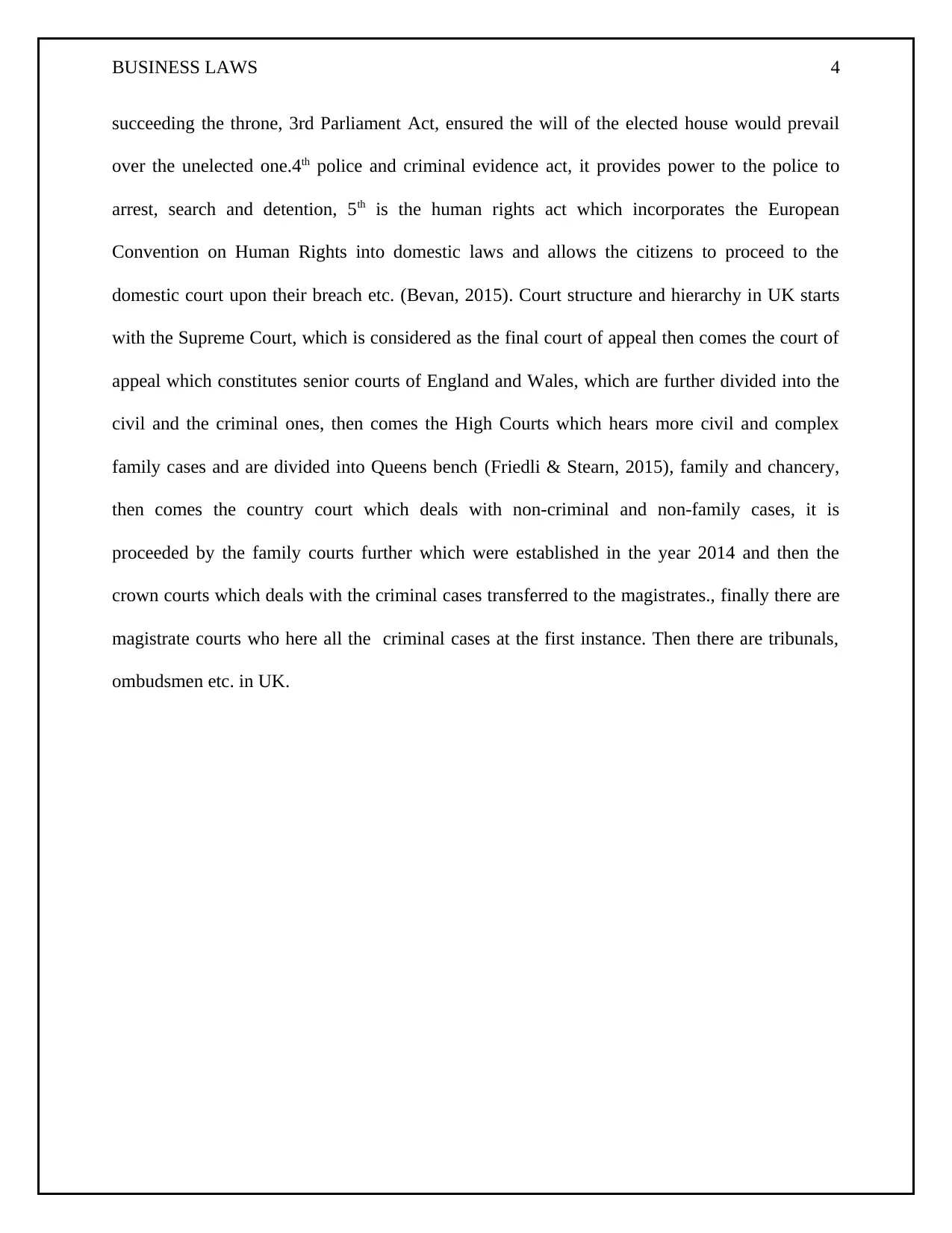
BUSINESS LAWS 4
succeeding the throne, 3rd Parliament Act, ensured the will of the elected house would prevail
over the unelected one.4th police and criminal evidence act, it provides power to the police to
arrest, search and detention, 5th is the human rights act which incorporates the European
Convention on Human Rights into domestic laws and allows the citizens to proceed to the
domestic court upon their breach etc. (Bevan, 2015). Court structure and hierarchy in UK starts
with the Supreme Court, which is considered as the final court of appeal then comes the court of
appeal which constitutes senior courts of England and Wales, which are further divided into the
civil and the criminal ones, then comes the High Courts which hears more civil and complex
family cases and are divided into Queens bench (Friedli & Stearn, 2015), family and chancery,
then comes the country court which deals with non-criminal and non-family cases, it is
proceeded by the family courts further which were established in the year 2014 and then the
crown courts which deals with the criminal cases transferred to the magistrates., finally there are
magistrate courts who here all the criminal cases at the first instance. Then there are tribunals,
ombudsmen etc. in UK.
succeeding the throne, 3rd Parliament Act, ensured the will of the elected house would prevail
over the unelected one.4th police and criminal evidence act, it provides power to the police to
arrest, search and detention, 5th is the human rights act which incorporates the European
Convention on Human Rights into domestic laws and allows the citizens to proceed to the
domestic court upon their breach etc. (Bevan, 2015). Court structure and hierarchy in UK starts
with the Supreme Court, which is considered as the final court of appeal then comes the court of
appeal which constitutes senior courts of England and Wales, which are further divided into the
civil and the criminal ones, then comes the High Courts which hears more civil and complex
family cases and are divided into Queens bench (Friedli & Stearn, 2015), family and chancery,
then comes the country court which deals with non-criminal and non-family cases, it is
proceeded by the family courts further which were established in the year 2014 and then the
crown courts which deals with the criminal cases transferred to the magistrates., finally there are
magistrate courts who here all the criminal cases at the first instance. Then there are tribunals,
ombudsmen etc. in UK.
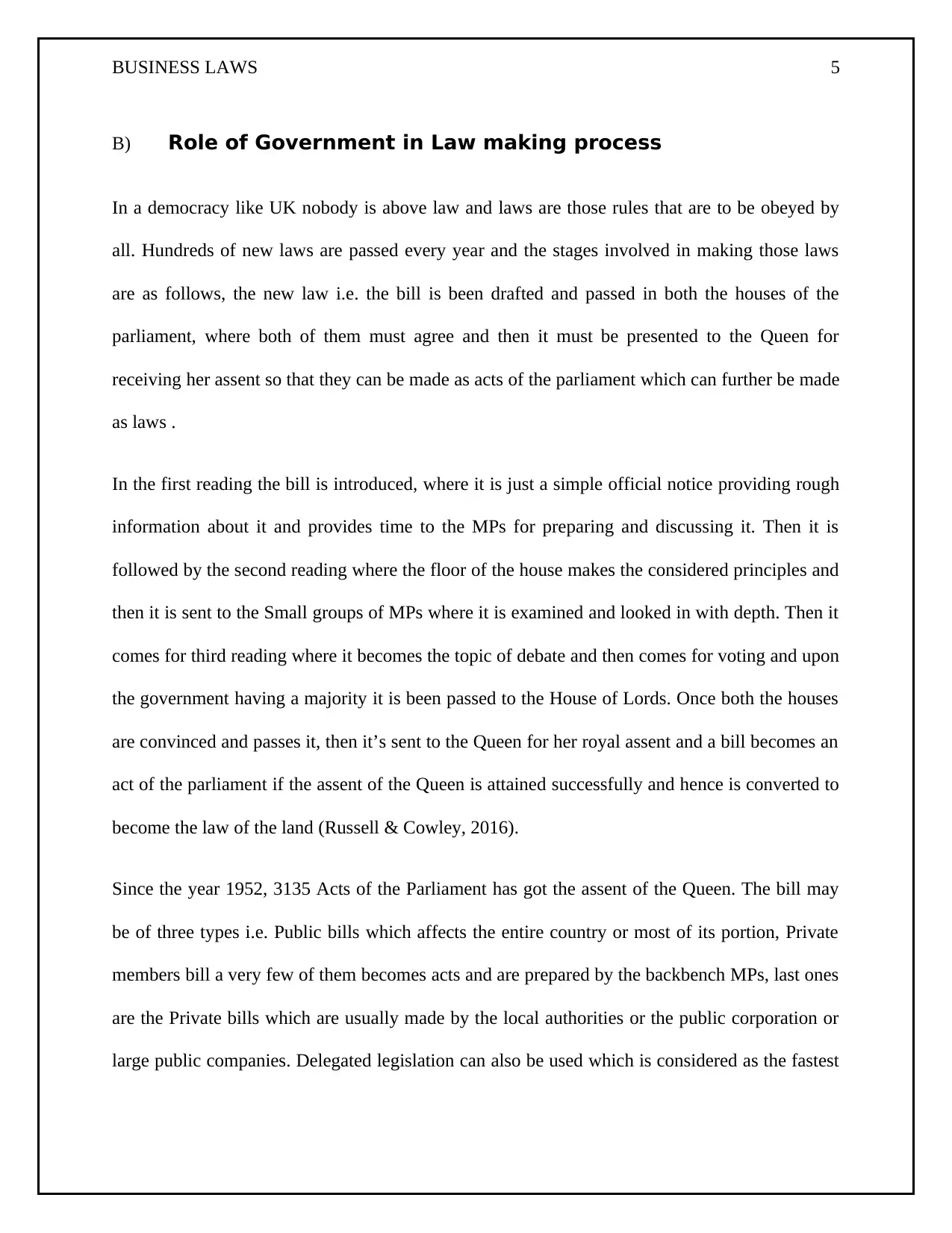
BUSINESS LAWS 5
B) Role of Government in Law making process
In a democracy like UK nobody is above law and laws are those rules that are to be obeyed by
all. Hundreds of new laws are passed every year and the stages involved in making those laws
are as follows, the new law i.e. the bill is been drafted and passed in both the houses of the
parliament, where both of them must agree and then it must be presented to the Queen for
receiving her assent so that they can be made as acts of the parliament which can further be made
as laws .
In the first reading the bill is introduced, where it is just a simple official notice providing rough
information about it and provides time to the MPs for preparing and discussing it. Then it is
followed by the second reading where the floor of the house makes the considered principles and
then it is sent to the Small groups of MPs where it is examined and looked in with depth. Then it
comes for third reading where it becomes the topic of debate and then comes for voting and upon
the government having a majority it is been passed to the House of Lords. Once both the houses
are convinced and passes it, then it’s sent to the Queen for her royal assent and a bill becomes an
act of the parliament if the assent of the Queen is attained successfully and hence is converted to
become the law of the land (Russell & Cowley, 2016).
Since the year 1952, 3135 Acts of the Parliament has got the assent of the Queen. The bill may
be of three types i.e. Public bills which affects the entire country or most of its portion, Private
members bill a very few of them becomes acts and are prepared by the backbench MPs, last ones
are the Private bills which are usually made by the local authorities or the public corporation or
large public companies. Delegated legislation can also be used which is considered as the fastest
B) Role of Government in Law making process
In a democracy like UK nobody is above law and laws are those rules that are to be obeyed by
all. Hundreds of new laws are passed every year and the stages involved in making those laws
are as follows, the new law i.e. the bill is been drafted and passed in both the houses of the
parliament, where both of them must agree and then it must be presented to the Queen for
receiving her assent so that they can be made as acts of the parliament which can further be made
as laws .
In the first reading the bill is introduced, where it is just a simple official notice providing rough
information about it and provides time to the MPs for preparing and discussing it. Then it is
followed by the second reading where the floor of the house makes the considered principles and
then it is sent to the Small groups of MPs where it is examined and looked in with depth. Then it
comes for third reading where it becomes the topic of debate and then comes for voting and upon
the government having a majority it is been passed to the House of Lords. Once both the houses
are convinced and passes it, then it’s sent to the Queen for her royal assent and a bill becomes an
act of the parliament if the assent of the Queen is attained successfully and hence is converted to
become the law of the land (Russell & Cowley, 2016).
Since the year 1952, 3135 Acts of the Parliament has got the assent of the Queen. The bill may
be of three types i.e. Public bills which affects the entire country or most of its portion, Private
members bill a very few of them becomes acts and are prepared by the backbench MPs, last ones
are the Private bills which are usually made by the local authorities or the public corporation or
large public companies. Delegated legislation can also be used which is considered as the fastest
⊘ This is a preview!⊘
Do you want full access?
Subscribe today to unlock all pages.

Trusted by 1+ million students worldwide
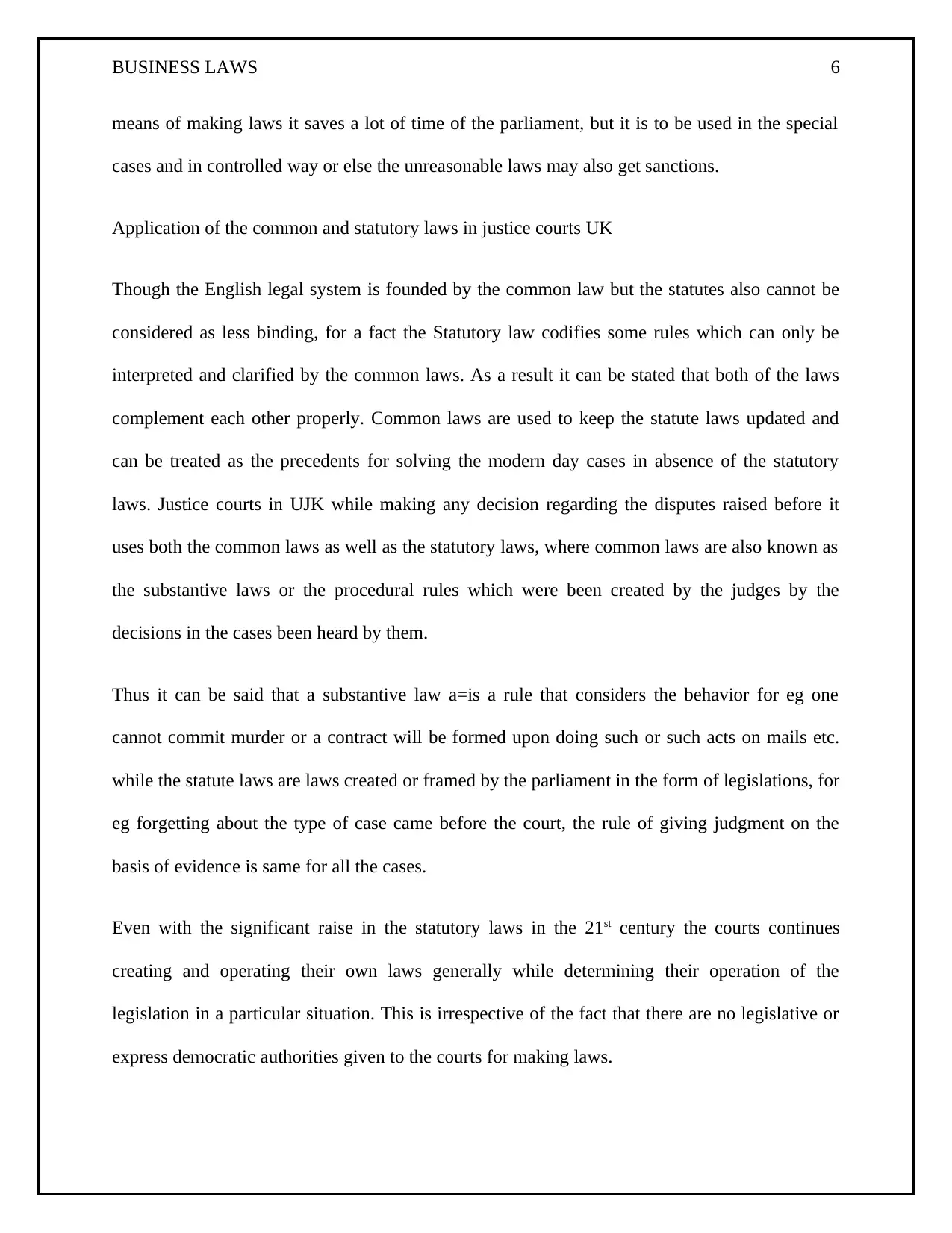
BUSINESS LAWS 6
means of making laws it saves a lot of time of the parliament, but it is to be used in the special
cases and in controlled way or else the unreasonable laws may also get sanctions.
Application of the common and statutory laws in justice courts UK
Though the English legal system is founded by the common law but the statutes also cannot be
considered as less binding, for a fact the Statutory law codifies some rules which can only be
interpreted and clarified by the common laws. As a result it can be stated that both of the laws
complement each other properly. Common laws are used to keep the statute laws updated and
can be treated as the precedents for solving the modern day cases in absence of the statutory
laws. Justice courts in UJK while making any decision regarding the disputes raised before it
uses both the common laws as well as the statutory laws, where common laws are also known as
the substantive laws or the procedural rules which were been created by the judges by the
decisions in the cases been heard by them.
Thus it can be said that a substantive law a=is a rule that considers the behavior for eg one
cannot commit murder or a contract will be formed upon doing such or such acts on mails etc.
while the statute laws are laws created or framed by the parliament in the form of legislations, for
eg forgetting about the type of case came before the court, the rule of giving judgment on the
basis of evidence is same for all the cases.
Even with the significant raise in the statutory laws in the 21st century the courts continues
creating and operating their own laws generally while determining their operation of the
legislation in a particular situation. This is irrespective of the fact that there are no legislative or
express democratic authorities given to the courts for making laws.
means of making laws it saves a lot of time of the parliament, but it is to be used in the special
cases and in controlled way or else the unreasonable laws may also get sanctions.
Application of the common and statutory laws in justice courts UK
Though the English legal system is founded by the common law but the statutes also cannot be
considered as less binding, for a fact the Statutory law codifies some rules which can only be
interpreted and clarified by the common laws. As a result it can be stated that both of the laws
complement each other properly. Common laws are used to keep the statute laws updated and
can be treated as the precedents for solving the modern day cases in absence of the statutory
laws. Justice courts in UJK while making any decision regarding the disputes raised before it
uses both the common laws as well as the statutory laws, where common laws are also known as
the substantive laws or the procedural rules which were been created by the judges by the
decisions in the cases been heard by them.
Thus it can be said that a substantive law a=is a rule that considers the behavior for eg one
cannot commit murder or a contract will be formed upon doing such or such acts on mails etc.
while the statute laws are laws created or framed by the parliament in the form of legislations, for
eg forgetting about the type of case came before the court, the rule of giving judgment on the
basis of evidence is same for all the cases.
Even with the significant raise in the statutory laws in the 21st century the courts continues
creating and operating their own laws generally while determining their operation of the
legislation in a particular situation. This is irrespective of the fact that there are no legislative or
express democratic authorities given to the courts for making laws.
Paraphrase This Document
Need a fresh take? Get an instant paraphrase of this document with our AI Paraphraser
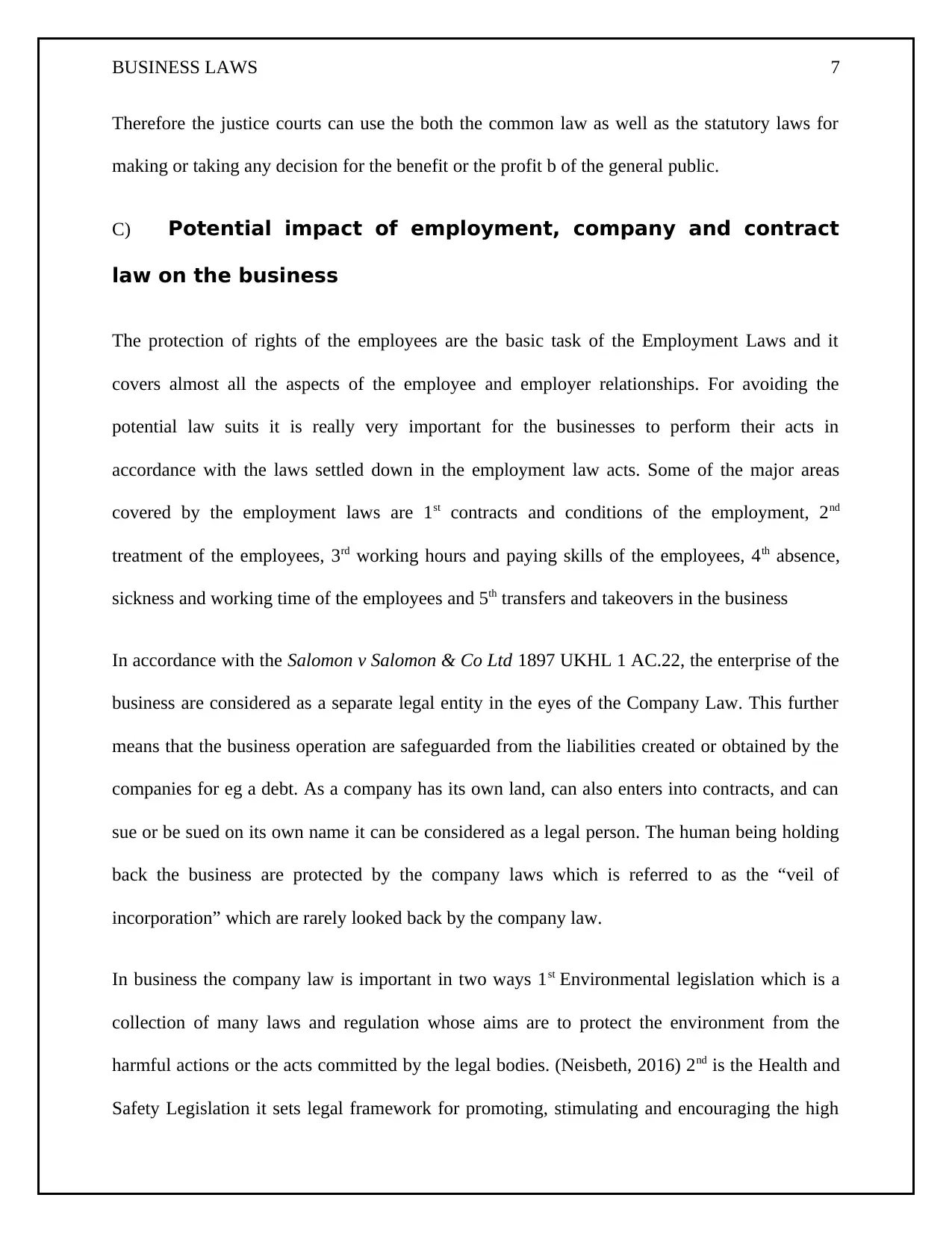
BUSINESS LAWS 7
Therefore the justice courts can use the both the common law as well as the statutory laws for
making or taking any decision for the benefit or the profit b of the general public.
C) Potential impact of employment, company and contract
law on the business
The protection of rights of the employees are the basic task of the Employment Laws and it
covers almost all the aspects of the employee and employer relationships. For avoiding the
potential law suits it is really very important for the businesses to perform their acts in
accordance with the laws settled down in the employment law acts. Some of the major areas
covered by the employment laws are 1st contracts and conditions of the employment, 2nd
treatment of the employees, 3rd working hours and paying skills of the employees, 4th absence,
sickness and working time of the employees and 5th transfers and takeovers in the business
In accordance with the Salomon v Salomon & Co Ltd 1897 UKHL 1 AC.22, the enterprise of the
business are considered as a separate legal entity in the eyes of the Company Law. This further
means that the business operation are safeguarded from the liabilities created or obtained by the
companies for eg a debt. As a company has its own land, can also enters into contracts, and can
sue or be sued on its own name it can be considered as a legal person. The human being holding
back the business are protected by the company laws which is referred to as the “veil of
incorporation” which are rarely looked back by the company law.
In business the company law is important in two ways 1st Environmental legislation which is a
collection of many laws and regulation whose aims are to protect the environment from the
harmful actions or the acts committed by the legal bodies. (Neisbeth, 2016) 2nd is the Health and
Safety Legislation it sets legal framework for promoting, stimulating and encouraging the high
Therefore the justice courts can use the both the common law as well as the statutory laws for
making or taking any decision for the benefit or the profit b of the general public.
C) Potential impact of employment, company and contract
law on the business
The protection of rights of the employees are the basic task of the Employment Laws and it
covers almost all the aspects of the employee and employer relationships. For avoiding the
potential law suits it is really very important for the businesses to perform their acts in
accordance with the laws settled down in the employment law acts. Some of the major areas
covered by the employment laws are 1st contracts and conditions of the employment, 2nd
treatment of the employees, 3rd working hours and paying skills of the employees, 4th absence,
sickness and working time of the employees and 5th transfers and takeovers in the business
In accordance with the Salomon v Salomon & Co Ltd 1897 UKHL 1 AC.22, the enterprise of the
business are considered as a separate legal entity in the eyes of the Company Law. This further
means that the business operation are safeguarded from the liabilities created or obtained by the
companies for eg a debt. As a company has its own land, can also enters into contracts, and can
sue or be sued on its own name it can be considered as a legal person. The human being holding
back the business are protected by the company laws which is referred to as the “veil of
incorporation” which are rarely looked back by the company law.
In business the company law is important in two ways 1st Environmental legislation which is a
collection of many laws and regulation whose aims are to protect the environment from the
harmful actions or the acts committed by the legal bodies. (Neisbeth, 2016) 2nd is the Health and
Safety Legislation it sets legal framework for promoting, stimulating and encouraging the high
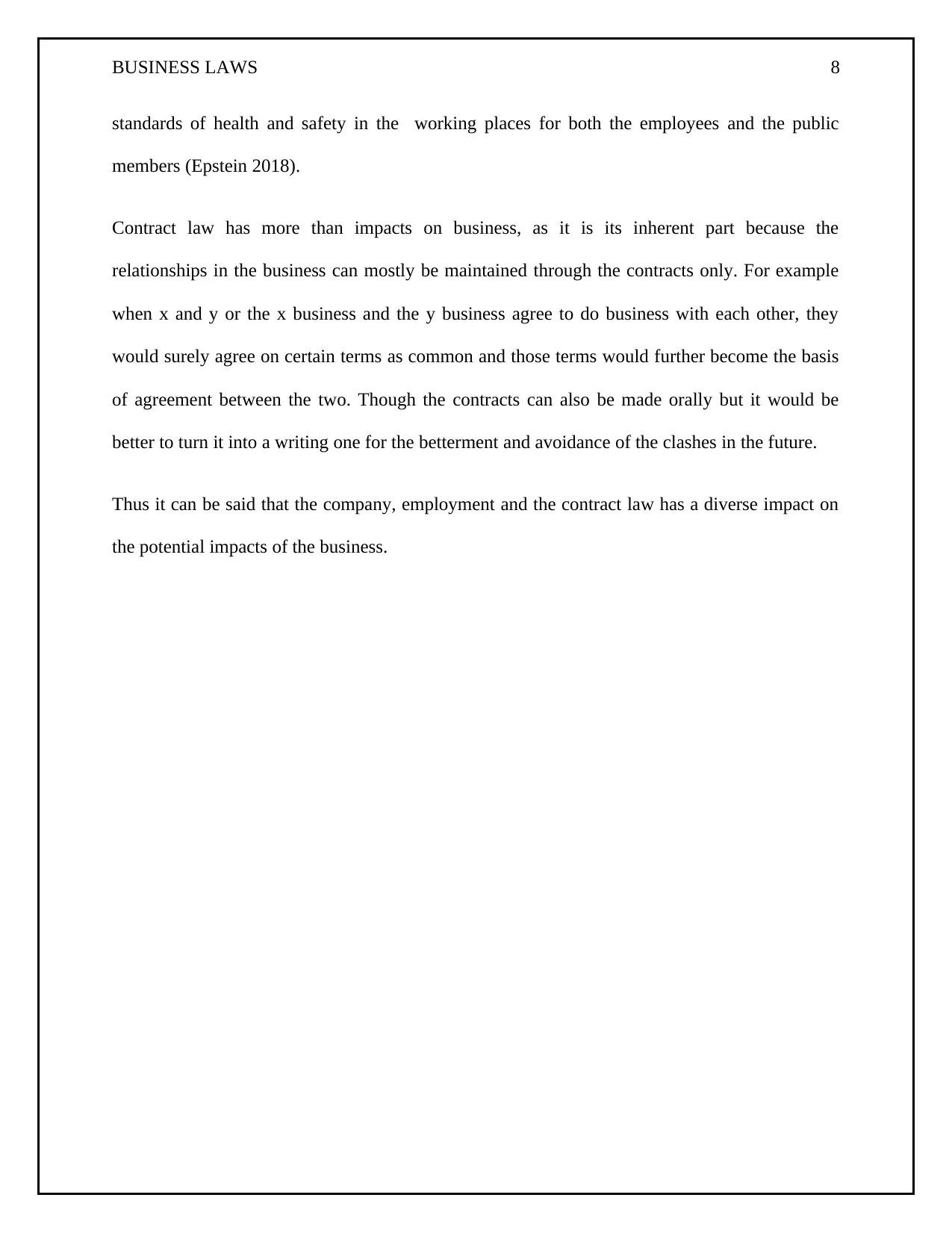
BUSINESS LAWS 8
standards of health and safety in the working places for both the employees and the public
members (Epstein 2018).
Contract law has more than impacts on business, as it is its inherent part because the
relationships in the business can mostly be maintained through the contracts only. For example
when x and y or the x business and the y business agree to do business with each other, they
would surely agree on certain terms as common and those terms would further become the basis
of agreement between the two. Though the contracts can also be made orally but it would be
better to turn it into a writing one for the betterment and avoidance of the clashes in the future.
Thus it can be said that the company, employment and the contract law has a diverse impact on
the potential impacts of the business.
standards of health and safety in the working places for both the employees and the public
members (Epstein 2018).
Contract law has more than impacts on business, as it is its inherent part because the
relationships in the business can mostly be maintained through the contracts only. For example
when x and y or the x business and the y business agree to do business with each other, they
would surely agree on certain terms as common and those terms would further become the basis
of agreement between the two. Though the contracts can also be made orally but it would be
better to turn it into a writing one for the betterment and avoidance of the clashes in the future.
Thus it can be said that the company, employment and the contract law has a diverse impact on
the potential impacts of the business.
⊘ This is a preview!⊘
Do you want full access?
Subscribe today to unlock all pages.

Trusted by 1+ million students worldwide
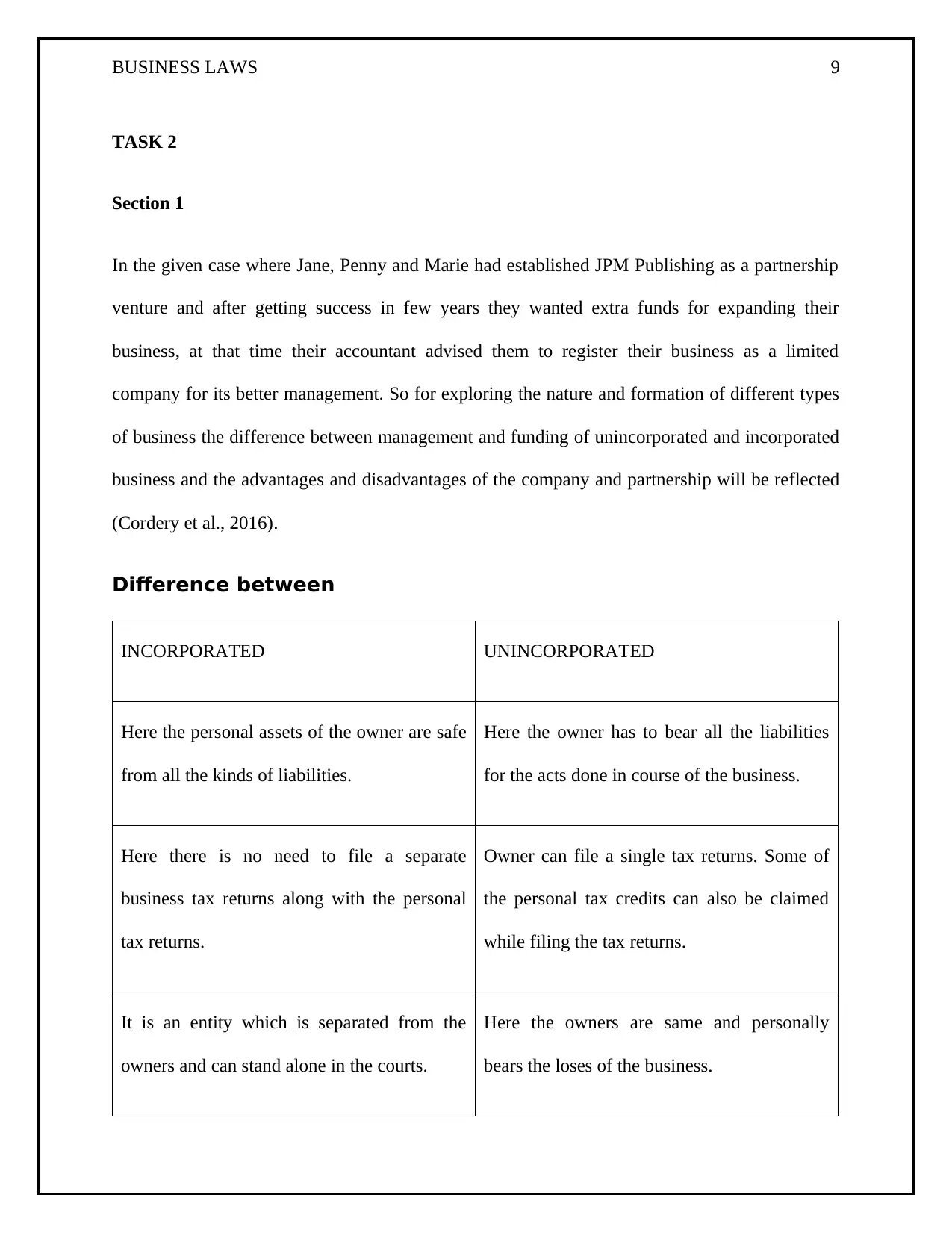
BUSINESS LAWS 9
TASK 2
Section 1
In the given case where Jane, Penny and Marie had established JPM Publishing as a partnership
venture and after getting success in few years they wanted extra funds for expanding their
business, at that time their accountant advised them to register their business as a limited
company for its better management. So for exploring the nature and formation of different types
of business the difference between management and funding of unincorporated and incorporated
business and the advantages and disadvantages of the company and partnership will be reflected
(Cordery et al., 2016).
Difference between
INCORPORATED UNINCORPORATED
Here the personal assets of the owner are safe
from all the kinds of liabilities.
Here the owner has to bear all the liabilities
for the acts done in course of the business.
Here there is no need to file a separate
business tax returns along with the personal
tax returns.
Owner can file a single tax returns. Some of
the personal tax credits can also be claimed
while filing the tax returns.
It is an entity which is separated from the
owners and can stand alone in the courts.
Here the owners are same and personally
bears the loses of the business.
TASK 2
Section 1
In the given case where Jane, Penny and Marie had established JPM Publishing as a partnership
venture and after getting success in few years they wanted extra funds for expanding their
business, at that time their accountant advised them to register their business as a limited
company for its better management. So for exploring the nature and formation of different types
of business the difference between management and funding of unincorporated and incorporated
business and the advantages and disadvantages of the company and partnership will be reflected
(Cordery et al., 2016).
Difference between
INCORPORATED UNINCORPORATED
Here the personal assets of the owner are safe
from all the kinds of liabilities.
Here the owner has to bear all the liabilities
for the acts done in course of the business.
Here there is no need to file a separate
business tax returns along with the personal
tax returns.
Owner can file a single tax returns. Some of
the personal tax credits can also be claimed
while filing the tax returns.
It is an entity which is separated from the
owners and can stand alone in the courts.
Here the owners are same and personally
bears the loses of the business.
Paraphrase This Document
Need a fresh take? Get an instant paraphrase of this document with our AI Paraphraser
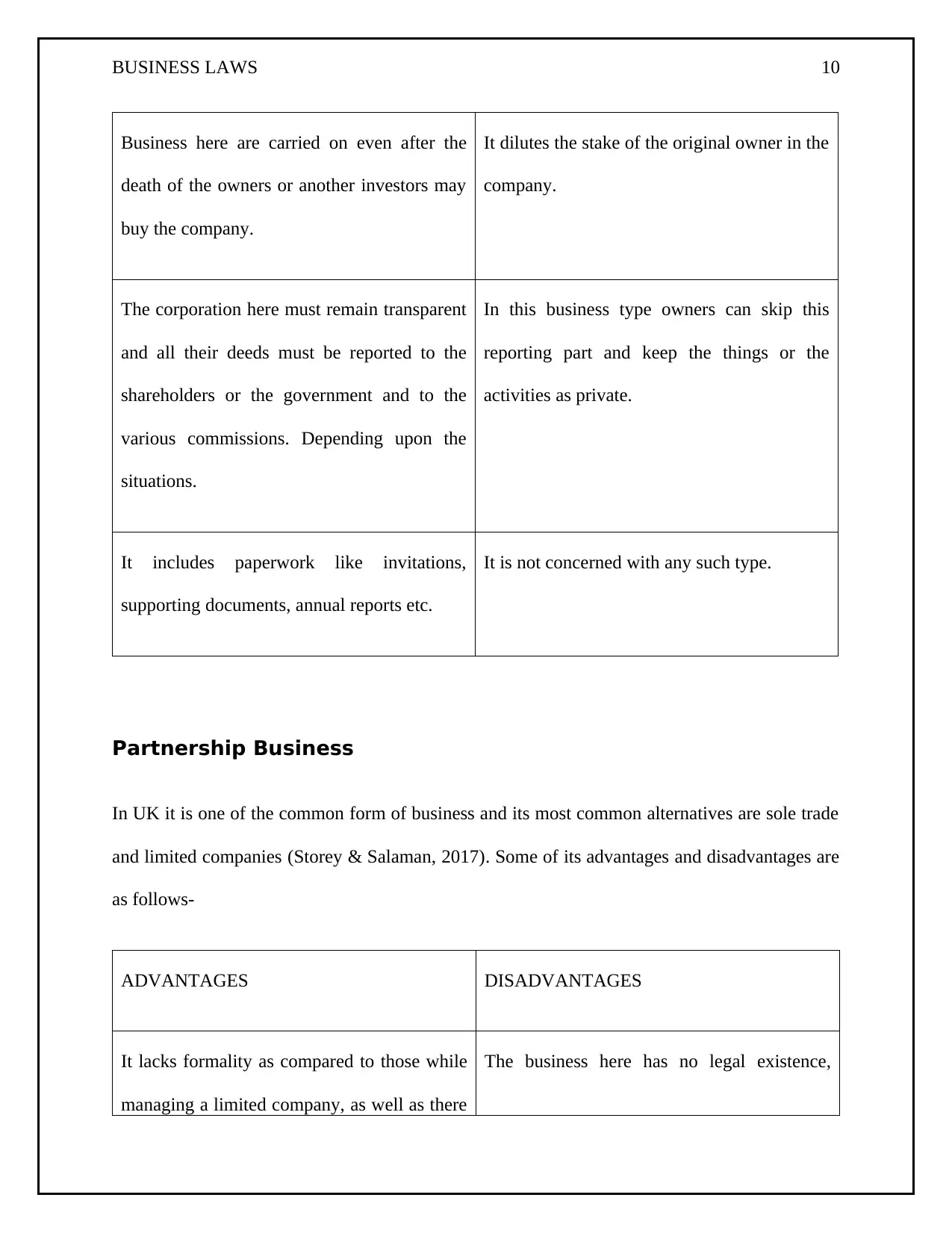
BUSINESS LAWS 10
Business here are carried on even after the
death of the owners or another investors may
buy the company.
It dilutes the stake of the original owner in the
company.
The corporation here must remain transparent
and all their deeds must be reported to the
shareholders or the government and to the
various commissions. Depending upon the
situations.
In this business type owners can skip this
reporting part and keep the things or the
activities as private.
It includes paperwork like invitations,
supporting documents, annual reports etc.
It is not concerned with any such type.
Partnership Business
In UK it is one of the common form of business and its most common alternatives are sole trade
and limited companies (Storey & Salaman, 2017). Some of its advantages and disadvantages are
as follows-
ADVANTAGES DISADVANTAGES
It lacks formality as compared to those while
managing a limited company, as well as there
The business here has no legal existence,
Business here are carried on even after the
death of the owners or another investors may
buy the company.
It dilutes the stake of the original owner in the
company.
The corporation here must remain transparent
and all their deeds must be reported to the
shareholders or the government and to the
various commissions. Depending upon the
situations.
In this business type owners can skip this
reporting part and keep the things or the
activities as private.
It includes paperwork like invitations,
supporting documents, annual reports etc.
It is not concerned with any such type.
Partnership Business
In UK it is one of the common form of business and its most common alternatives are sole trade
and limited companies (Storey & Salaman, 2017). Some of its advantages and disadvantages are
as follows-
ADVANTAGES DISADVANTAGES
It lacks formality as compared to those while
managing a limited company, as well as there
The business here has no legal existence,
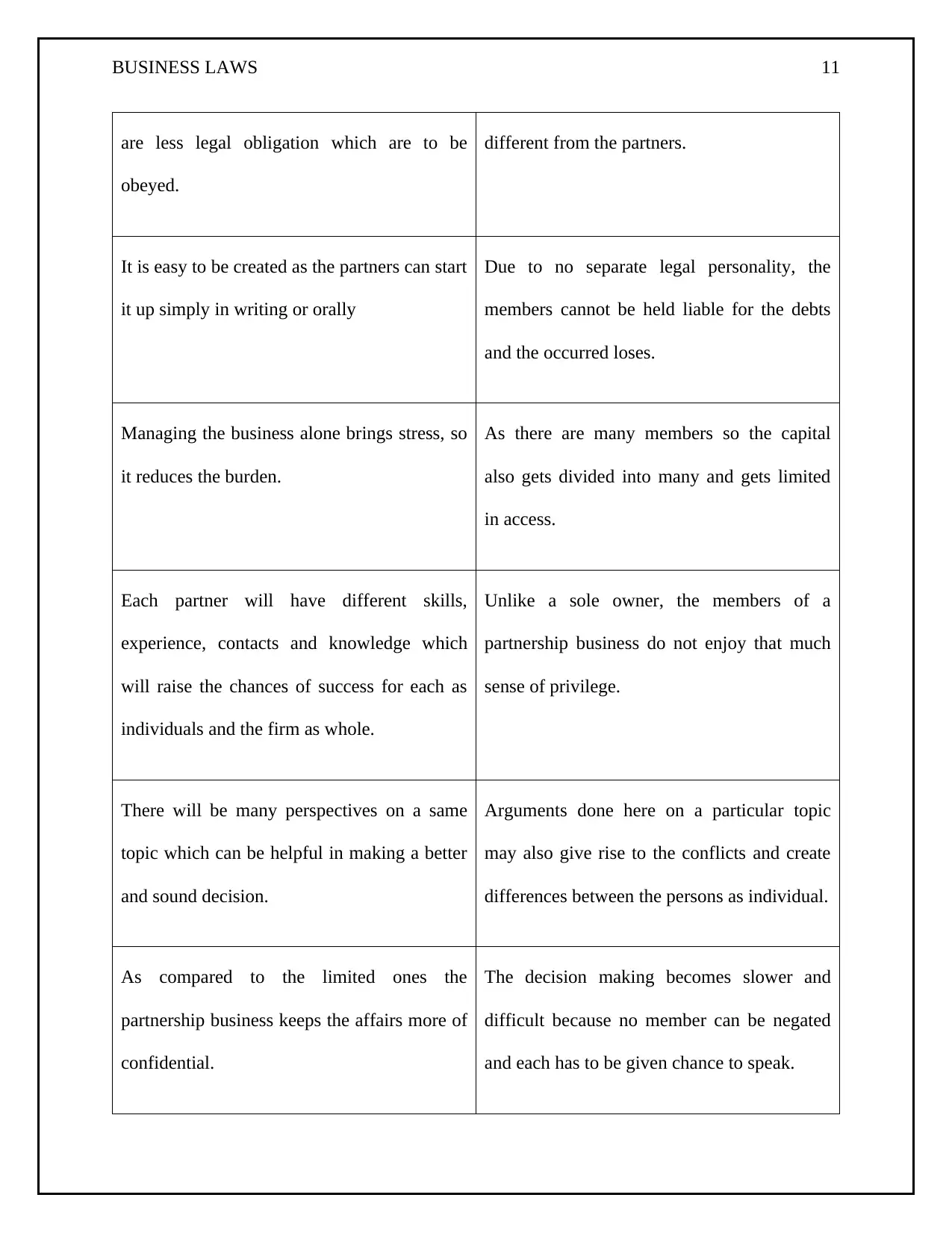
BUSINESS LAWS 11
are less legal obligation which are to be
obeyed.
different from the partners.
It is easy to be created as the partners can start
it up simply in writing or orally
Due to no separate legal personality, the
members cannot be held liable for the debts
and the occurred loses.
Managing the business alone brings stress, so
it reduces the burden.
As there are many members so the capital
also gets divided into many and gets limited
in access.
Each partner will have different skills,
experience, contacts and knowledge which
will raise the chances of success for each as
individuals and the firm as whole.
Unlike a sole owner, the members of a
partnership business do not enjoy that much
sense of privilege.
There will be many perspectives on a same
topic which can be helpful in making a better
and sound decision.
Arguments done here on a particular topic
may also give rise to the conflicts and create
differences between the persons as individual.
As compared to the limited ones the
partnership business keeps the affairs more of
confidential.
The decision making becomes slower and
difficult because no member can be negated
and each has to be given chance to speak.
are less legal obligation which are to be
obeyed.
different from the partners.
It is easy to be created as the partners can start
it up simply in writing or orally
Due to no separate legal personality, the
members cannot be held liable for the debts
and the occurred loses.
Managing the business alone brings stress, so
it reduces the burden.
As there are many members so the capital
also gets divided into many and gets limited
in access.
Each partner will have different skills,
experience, contacts and knowledge which
will raise the chances of success for each as
individuals and the firm as whole.
Unlike a sole owner, the members of a
partnership business do not enjoy that much
sense of privilege.
There will be many perspectives on a same
topic which can be helpful in making a better
and sound decision.
Arguments done here on a particular topic
may also give rise to the conflicts and create
differences between the persons as individual.
As compared to the limited ones the
partnership business keeps the affairs more of
confidential.
The decision making becomes slower and
difficult because no member can be negated
and each has to be given chance to speak.
⊘ This is a preview!⊘
Do you want full access?
Subscribe today to unlock all pages.

Trusted by 1+ million students worldwide
1 out of 20
Related Documents
Your All-in-One AI-Powered Toolkit for Academic Success.
+13062052269
info@desklib.com
Available 24*7 on WhatsApp / Email
![[object Object]](/_next/static/media/star-bottom.7253800d.svg)
Unlock your academic potential
Copyright © 2020–2026 A2Z Services. All Rights Reserved. Developed and managed by ZUCOL.



